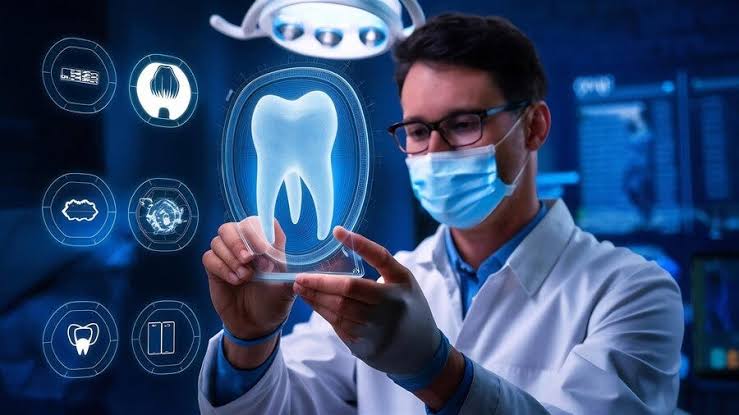Health
The Role of AI in Revolutionizing Dental Diagnostics

In recent years, artificial intelligence (AI) has emerged as a transformative force across various industries, including healthcare. One field that has seen remarkable advancements is dentistry, where AI is revolutionizing diagnostics, enhancing patient care, and streamlining workflows. From improving accuracy in detecting oral health issues to enabling personalized treatment plans, AI is reshaping how dental professionals approach their work.
Enhancing Diagnostic Accuracy
Dental diagnostics rely heavily on the precise interpretation of X-rays, 3D scans, and other imaging modalities. Traditionally, this process has been time-consuming and subject to human error. AI-powered diagnostic tools, like those offered by Diagnocat, leverage advanced algorithms to analyze dental images with exceptional accuracy. These systems can detect issues such as cavities, root fractures, periodontal disease, and more—often identifying problems that might be missed by the human eye.
With AI, dental practitioners can diagnose conditions earlier and more accurately, leading to better outcomes for patients. The technology also ensures consistency, reducing variability between different practitioners’ interpretations.
Streamlining Workflows for Dental Professionals
Time is a precious commodity in any dental practice, and AI significantly optimizes workflows. Automated AI systems can analyze patient data in seconds, providing dentists with actionable insights. This means less time spent on manual diagnostics and more time for patient interaction and care.
Moreover, platforms like Diagnocat’s comprehensive diagnostic solution seamlessly integrate with dental management systems, offering a user-friendly interface that simplifies case management and patient record maintenance. This reduces administrative burdens and enhances practice efficiency.
Enabling Personalized Treatment Plans
Every patient is unique, and AI allows for a more tailored approach to treatment. By analyzing large datasets, AI systems can predict outcomes, suggest personalized treatment plans, and even simulate potential results. For instance, AI-driven tools can assist in planning orthodontic treatments, ensuring precise alignments and better aesthetics.
This personalized approach not only improves patient satisfaction but also builds trust between patients and practitioners, as they see clear, data-driven justifications for recommended treatments.
Promoting Preventative Dentistry
AI doesn’t just help in diagnosing existing conditions; it also plays a crucial role in preventative dentistry. By analyzing trends and patterns in patient data, AI can predict the likelihood of certain dental issues before they arise. Dentists can then provide preventive care, reducing the need for invasive treatments and improving long-term oral health outcomes.
The Future of AI in Dentistry
As AI technology continues to evolve, its role in dentistry will only expand. Future innovations may include real-time diagnostics during procedures, virtual consultations powered by AI, and even predictive maintenance for dental equipment. Companies like Diagnocat are at the forefront of this transformation, driving innovation and setting new standards in dental care.
Conclusion
The integration of AI into dental diagnostics marks a new era of precision, efficiency, and patient-centric care. With tools that enhance accuracy, streamline workflows, and support personalized treatments, AI is empowering dental professionals to deliver superior care. For practices looking to embrace this revolution, partnering with advanced AI solutions like those provided by Diagnocat is a step toward the future of dentistry.
Explore how Diagnocat is leading the charge in AI-driven dental diagnostics by visiti.
Health
springhillmedgroup.com: A Trusted Hub for Modern, Patient-Centered Healthcare

Healthcare decisions shape lives. Choosing where to receive care affects not only physical well-being, but also peace of mind, confidence, and long-term outcomes. springhillmedgroup.com represents more than just a medical website—it reflects a modern approach to healthcare where trust, accessibility, and whole-person treatment matter.
In this in-depth guide, you’ll explore what springhillmedgroup.com stands for, the values behind it, the types of care it represents, and why platforms like this are becoming essential in today’s healthcare landscape. Whether you’re a patient, caregiver, or simply researching quality medical services, this article will help you understand the role and importance of springhillmedgroup.com in a clear, human way.
Overview of springhillmedgroup.com
Before diving deeper, it helps to understand the platform at a glance.
| Aspect | Details |
|---|---|
| Website Name | springhillmedgroup.com |
| Core Purpose | Medical group information and patient care access |
| Focus | Patient-centered healthcare services |
| Audience | Patients, families, caregivers, and healthcare seekers |
| Care Philosophy | Holistic, compassionate, and evidence-based |
This snapshot sets the stage for why springhillmedgroup.com resonates with people seeking dependable healthcare guidance and services.
What is springhillmedgroup.com
At its heart, springhillmedgroup.com reflects a mission rooted in care, clarity, and connection. Modern patients don’t just want treatment; they want understanding. They want providers who listen, explain, and guide rather than rush or dismiss concerns.
You May Also Read: DigitalNewsAlerts.com: Smarter Way to Stay Informed Daily
The philosophy behind springhillmedgroup.com emphasizes relationships over transactions. Healthcare becomes a partnership instead of a one-sided experience. Patients are encouraged to take an active role in their health journey while clinicians support them with knowledge, empathy, and clinical skill.
This approach mirrors a broader shift in healthcare toward long-term wellness instead of short-term fixes. Prevention, education, and continuity of care are treated as equally important as diagnosis and treatment.
A Patient-Centered Approach to Care
Why Patient-Centered Care Matters
Patient-centered care means every decision starts with the individual, not the system. springhillmedgroup.com embodies this idea by focusing on respect, communication, and personalization.
Instead of viewing patients as charts or appointment slots, patient-centered care recognizes lived experiences. Symptoms are discussed in context. Concerns are validated. Treatment plans are explained clearly, empowering patients to make informed decisions.
Research consistently shows that when patients feel heard, outcomes improve. Trust grows, compliance increases, and anxiety decreases. springhillmedgroup.com reflects these principles through its structure and messaging.
Building Trust Through Transparency
Transparency builds confidence. Clear explanations of services, expectations, and care processes help patients feel prepared instead of overwhelmed. Platforms like springhillmedgroup.com serve as a bridge between medical complexity and everyday understanding.
By offering accessible information, patients can arrive at appointments informed, curious, and ready to participate. That sense of readiness transforms healthcare from intimidating to collaborative.
Types of Medical Services Represented
Healthcare rarely fits into a single category. springhillmedgroup.com reflects a broad, integrated approach that aligns with modern medical group models.
Primary and Preventive Care
Primary care forms the foundation of good health. Regular checkups, screenings, and wellness visits allow early detection and proactive management. This type of care emphasizes continuity, where providers know a patient’s history, lifestyle, and goals.
Preventive care reduces long-term risks. It’s like maintaining a car before it breaks down. springhillmedgroup.com highlights the importance of staying ahead of health concerns rather than reacting after problems arise.
Chronic Condition Management
Many people live with long-term conditions that require ongoing attention. Effective management isn’t just about medication; it’s about education, monitoring, and lifestyle support.
Through coordinated care models, medical groups represented by springhillmedgroup.com aim to help patients maintain quality of life. Small adjustments, when guided properly, can lead to meaningful improvements.
Coordinated Specialty Referrals
When specialized care is needed, coordination matters. Smooth referrals, shared records, and clear communication reduce stress and delays.
springhillmedgroup.com reflects an ecosystem where primary providers and specialists work together. This connected approach helps avoid duplication, confusion, and unnecessary procedures.
The Role of Digital Platforms in Modern Healthcare
Healthcare has moved beyond clinic walls. Digital platforms now play a critical role in how patients access information and engage with providers.
springhillmedgroup.com serves as a digital front door. It introduces values, explains services, and guides users toward appropriate care. For many patients, the website is the first interaction with a medical group, shaping expectations and trust.
Digital presence also supports accessibility. Patients can explore information at their own pace, revisit explanations, and share resources with family members. This flexibility is especially valuable for caregivers and individuals managing complex health situations.
Accessibility, Convenience, and Peace of Mind
Removing Barriers to Care
One of the greatest challenges in healthcare is access. Confusing systems, unclear instructions, and time constraints often prevent people from seeking help.
springhillmedgroup.com reflects efforts to simplify the patient journey. Clear pathways reduce uncertainty. When people know what to expect, they’re more likely to take the first step toward care.
Supporting Families and Caregivers
Healthcare rarely affects only one person. Families and caregivers play a vital role, especially for children, older adults, or those with chronic conditions.
By offering understandable information, platforms like springhillmedgroup.com help caregivers feel equipped rather than overwhelmed. Shared understanding strengthens support systems and improves overall outcomes.
Quality, Ethics, and Clinical Responsibility
Commitment to Evidence-Based Medicine
Trust in healthcare depends on integrity. springhillmedgroup.com reflects a commitment to evidence-based practice, where treatments are guided by research, clinical experience, and patient values.
This balanced approach avoids extremes. Care is neither overly aggressive nor dismissive. Instead, it’s thoughtful, measured, and responsive to individual needs.
Ethical Standards in Patient Care
Ethics form the backbone of medical practice. Respect for autonomy, confidentiality, and informed consent are non-negotiable.
The values associated with springhillmedgroup.com emphasize dignity and respect at every stage of care. Patients aren’t pressured. They’re informed, supported, and empowered.
How springhillmedgroup.com Supports Informed Decision-Making
Making health decisions can feel overwhelming. Information overload, conflicting advice, and fear often cloud judgment.
springhillmedgroup.com plays an educational role by framing healthcare choices in understandable terms. Instead of technical jargon, information is presented in ways that connect to everyday life.
Think of it like having a knowledgeable guide on a complex trail. The terrain may still be challenging, but guidance makes the journey safer and less intimidating.
Comparing Traditional and Modern Medical Group Models
| Feature | Traditional Model | Modern Group Model (springhillmedgroup.com) |
|---|---|---|
| Focus | Reactive treatment | Proactive, whole-person care |
| Communication | Limited, provider-driven | Collaborative, patient-driven |
| Continuity | Fragmented | Integrated and coordinated |
| Patient Role | Passive | Active participant |
This comparison highlights why many patients gravitate toward modern models reflected by springhillmedgroup.com.
Community Impact and Long-Term Wellness
Healthcare doesn’t exist in isolation. Communities thrive when individuals are healthy, informed, and supported.
springhillmedgroup.com reflects a broader commitment to community wellness. By encouraging preventive care and ongoing engagement, medical groups contribute to healthier families and workplaces.
Long-term wellness isn’t built overnight. It grows through consistent care, education, and trust. Platforms like springhillmedgroup.com help sustain that growth.
Adapting to Changing Healthcare Needs
Healthcare evolves constantly. New treatments, shifting demographics, and emerging challenges demand adaptability.
springhillmedgroup.com reflects flexibility in care delivery and communication. By staying responsive to patient needs, modern medical groups remain relevant and effective.
This adaptability is especially important during uncertain times, when clear guidance and trusted relationships matter most.
Conclusion
springhillmedgroup.com represents a thoughtful, patient-focused approach to modern healthcare. It reflects values of trust, transparency, and whole-person care that resonate deeply in today’s medical landscape. From preventive services to chronic condition support, the platform embodies a model where patients are partners, not bystanders.
Understanding what springhillmedgroup.com stands for helps patients make confident, informed choices about their health. By prioritizing clarity, compassion, and continuity, it contributes to better outcomes and stronger communities. When healthcare feels human, supportive, and accessible, everyone benefits—and that’s the lasting value reflected here.
Frequently Asked Questions (FAQs)
What is springhillmedgroup.com?
springhillmedgroup.com is an online platform representing a medical group focused on patient-centered healthcare services and information.
Who can benefit from springhillmedgroup.com?
Patients, families, caregivers, and anyone seeking reliable medical care guidance can benefit from the platform’s approach and resources.
Does springhillmedgroup.com focus only on treatment?
No. It emphasizes preventive care, education, and long-term wellness alongside treatment.
How does springhillmedgroup.com support patients?
It supports patients through clear information, coordinated care models, and an emphasis on communication and trust.
Why is patient-centered care important?
Patient-centered care improves understanding, trust, and outcomes by involving individuals actively in their health decisions.
Health
4 Tips to Enhance Your Medical IoT Device’s Security

Technological advancements are helping revolutionize the healthcare ecosystem, with the Internet of Things (IoT) taking center stage as one of the most innovative technologies playing crucial roles in optimizing medical processes. However, the major challenge with the adoption of IoT medical devices is security. Implementing robust IoT healthcare security measures to safeguard your medical IoT infrastructure is essential as the risks associated with the technology continue to grow. The market value of the Internet of Things for healthcare hit a staggering $99 billion over the last few years, making it one of the fastest-growing industries, projected to hit $480 billion by 2031. Prioritizing medical device IoT security is a great way to protect patient data and minimize the threats of cyberattacks that often challenge healthcare organizations.
How to Improve Your Medical Business IoT Device Security
From smart homes to healthcare, IoT devices make a substantial impact on major industries. Unfortunately, the proliferation of the technology comes with significant security risks. Boosting IoT device security is especially vital in healthcare to maintain patient trust and ensure compliance. The following points outline the best practices for improving medical IoT devices security in your healthcare business.
- Secure Your Cloud Platforms
Cloud platforms are the preferred methods of storing data for many medical organizations and other businesses. Securing your cloud platforms should be a primary concern for healthcare leaders who want to protect their organizations from data breaches. You can enhance your cloud platform security by using authentication controls, such as multi-factor authentication, changing passwords regularly, and properly managing permissions and user credentials.
- Encrypt Data and Update Your Software and Firmware
Encryption is a vital component in protecting data stored and transmitted by IoT-enabled devices. It ensures that data remains unreadable to unauthorized users in the event of a system compromise. Employing industry-leading encryption protocols will help fortify your IoT medical device security. Medical businesses are also advised to regularly update their software and firmware to boost security. IoT medical device manufacturers often release updates to fix vulnerabilities in existing systems. Keeping up with new updates can prevent security loopholes that can compromise your patients’ safety. Automating updates is a great strategy to counteract emerging threats.
- Collaborate with IoT Medical Security Experts
IoT experts such as Empeek help medical businesses transform their healthcare IoT security. Collaborating with IoT companies will help you address common healthcare security issues that negatively impact customers’ experience and decrease efficiency. IoT security professionals can recommend practical security tips that your facility can adopt to ensure that sensitive patient data and your IT network stay safe. You can read this post here to learn more about the best practices to protect your medical IoT devices.
- Establish Robust Security Framework
It’s essential for hospitals and clinics to develop comprehensive security frameworks that encompass every facet of IoT device security. Thi includes, but is not limited to using robust access controls, implementing network segmentation and identifying IoT vulnerabilities in healthcare. Establishing robust security frameworks like these will ensure that your organization has the highest level of security. IoT medical devices should be strictly monitored and access controls should be set up appropriately.
Over 1,400 cyberattacks hit healthcare organizations in 2022 worldwide, a 74 percent increase from 2021. Enhancing healthcare IoT security is a complex but vital task for healthcare business administrators. Fortunately, you can reduce the risks of data breaches by implementing the above tips to protect sensitive patient data.
Health
GetWildfulness.com: Nature’s Power to Transform Your Mind and Body

In a fast-paced world dominated by technology, constant connectivity, and overwhelming schedules, many individuals find themselves disconnected from the natural world. The demands of daily life can leave us feeling drained, mentally fatigued, and physically worn out. This is where GetWildfulness.com steps in, offering a transformative approach to healing and well-being through the power of nature.
At its core, GetWildfulness.com is a platform that emphasizes the deep connection between nature and mindful healing. It encourages individuals to reconnect with the environment around them, harnessing the calming effects of nature to restore balance to both mind and body. But what exactly is the power of nature, and how can it truly transform your health and well-being? Let’s explore the science behind it, the practices that make it effective, and the lasting benefits of embracing nature as a tool for mindful healing.
The Healing Power of Nature
Humans have evolved alongside nature, and for centuries, we’ve relied on natural spaces to find solace, clarity, and comfort. Recent studies have confirmed that being in nature can significantly reduce stress, anxiety, and depression, leading to improved mental and physical health. Nature has a unique ability to restore our bodies to a state of equilibrium, both physiologically and psychologically.
The Science of Nature’s Effect on Mental Health
Research has consistently shown that spending time in natural environments has a powerful impact on mental health. In a landmark study, researchers at the University of Chicago found that people who spent just 20 minutes a day in nature experienced lower levels of cortisol, the stress hormone, and an overall increase in feelings of well-being. Another study published in the journal Frontiers in Psychology demonstrated that exposure to green spaces can reduce the symptoms of anxiety and depression, improve mood, and even increase cognitive functioning.
The concept of nature therapy, or “ecotherapy,” is grounded in the idea that humans have a deep psychological and emotional need to connect with nature. It’s been shown that natural environments can help to lower blood pressure, reduce feelings of stress, and promote relaxation. Nature’s calming influence can bring about profound mental clarity and peace, which is essential for healing in today’s chaotic world.
Mindfulness: The Bridge Between Nature and Healing
Mindfulness is a practice that involves being fully present in the moment, observing thoughts and feelings without judgment. When combined with nature, mindfulness becomes an even more powerful tool for healing. GetWildfulness.com encourages individuals to practice mindfulness while immersed in nature’s beauty—whether that means taking a quiet walk through a forest, meditating by a lake, or simply sitting outdoors and absorbing the sights and sounds of the natural world.
Studies have found that mindfulness exercises in nature can enhance emotional regulation, increase self-awareness, and help individuals develop a deeper sense of calm and contentment. By being mindful in natural settings, we can begin to release accumulated tension, quiet our racing thoughts, and become more attuned to the present moment. This connection fosters a sense of inner peace and relaxation that is often difficult to achieve in the busyness of modern life.
Nature as a Natural Stress Reliever
One of the most powerful aspects of GetWildfulness.com is its emphasis on nature as a natural stress reliever. In our modern society, stress has become a ubiquitous part of everyday life. Whether it’s work-related stress, family obligations, or the constant pressure to stay connected and productive, the cumulative effects of stress can lead to burnout and various health issues.
However, nature provides a respite. The sights, sounds, and smells of natural environments have a profound impact on our stress levels. Simply being outside in a calming natural setting can reduce heart rate, lower blood pressure, and activate the parasympathetic nervous system, which is responsible for “rest and digest” functions. This makes nature a powerful antidote to the harmful effects of chronic stress, enabling individuals to regain their sense of balance and well-being.
The Role of Nature in Physical Health
The benefits of nature extend beyond mental health; they also play a significant role in physical well-being. Regular exposure to natural environments can help boost the immune system, improve sleep, and increase physical activity levels. Outdoor activities like hiking, walking, or even gardening have been shown to provide substantial cardiovascular benefits, while fresh air and natural sunlight contribute to improved vitamin D levels and overall health.
Moreover, studies have shown that spending time in nature can enhance recovery from illness. For example, patients who had access to nature views during their hospital stays tended to recover more quickly and report less pain than those without such access. This highlights the powerful role that nature plays in the body’s natural healing processes.
Mindful Practices for Healing
At GetWildfulness.com, there are several practices that individuals can engage in to experience the full benefits of nature’s healing power. Here are a few mindful activities to try:
- Nature Walks: Walking in nature not only provides physical exercise but also allows for moments of reflection and mindfulness. Whether it’s a stroll through a park or a hike through the woods, nature walks can help clear the mind and reduce stress.
- Forest Bathing (Shinrin Yoku): A Japanese practice known as Shinrin Yoku involves immersing oneself in a forest environment, breathing in the natural air, and being present in the moment. Studies have shown that forest bathing can lower cortisol levels, boost immune function, and enhance overall well-being.
- Meditation in Nature: Take your mindfulness practice outdoors. Find a quiet spot in a garden, by a lake, or in the forest, and focus on your breath. Nature’s calm surroundings will enhance your meditation practice, helping you connect more deeply with your inner self.
- Journaling in Nature: Bring a journal along on your nature excursions. Writing down your thoughts, reflections, and experiences while surrounded by nature can help process emotions, release stress, and gain insights into personal growth.
The Lasting Benefits of Nature Healing
The transformation that comes from engaging with nature is not just temporary—it’s lasting. Individuals who regularly immerse themselves in natural environments for mindful healing often report long-term benefits, such as improved emotional regulation, better physical health, and increased resilience to stress. Nature provides a sustainable, non-invasive approach to mental and physical well-being that can be integrated into everyday life.
Moreover, GetWildfulness.com encourages people to make nature a regular part of their healing journey. Whether it’s carving out time each week to spend outdoors or integrating nature-based mindfulness practices into daily routines, the key to sustaining these benefits is consistency.
Conclusion: Embrace the Healing Power of Nature
Incorporating nature into your daily life is not just a trend—it’s a return to something deeply embedded in our DNA. GetWildfulness.com offers a platform for individuals to tap into the healing power of nature and transform their minds and bodies in a profound way. By embracing mindful practices in natural settings, we can unlock the immense potential for healing, rejuvenation, and personal growth that nature offers.
If you’re ready to experience the benefits of nature firsthand, start by stepping outside, breathing deeply, and embracing the world around you. With the guidance of GetWildfulness.com, the journey toward a healthier, more balanced life begins in nature.





